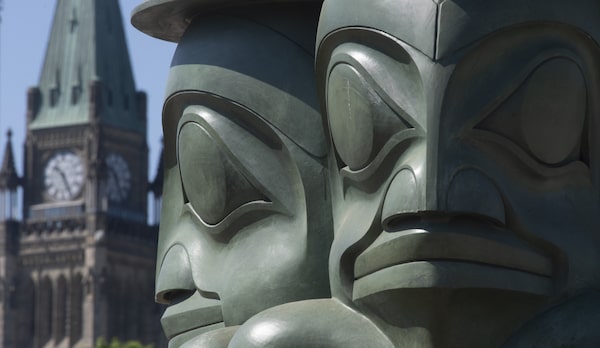
The Three Watchmen statue, created by hereditary chief of the Staast'as Eagle Clan James Hart, is seen near Parliament Hill, in Ottawa, on June 2, 2021.Adrian Wyld/The Canadian Press
The Native Women’s Association of Canada says the federal government has made little progress in the past year on its plan to end violence against Indigenous women, girls and gender-diverse people.
There have been funding commitments, but little has been done to directly support survivors and families, said an analysis released Friday by the group.
“Today, we are seeing the sad results of the government’s weak response to the crimes being committed against Indigenous women, girls, and gender-diverse people,” said CEO Lynne Groulx.
“The National Action Plan, as it was drafted, was actually a recipe for inaction, and the people represented by our organization are paying the price.”
The association tracked commitments made by the government and assessed their implementation.
While some progress has been made over the past 12 months on some fronts, little or none has been made on others, the organization said.
The national plan was at the top of 231 calls to justice put forth by the National Inquiry into Missing and Murdered Indigenous Women and Girls in its final report three years ago.
The association was one of the groups working with Ottawa on the plan, but walked away saying the exercise was fundamentally flawed and politically motivated.
The federal government committed to provide funding or enhance existing funding in four areas: culture, health and wellness, human safety, and security and justice.
Ottawa released its own progress report Friday. In it, the federal government documents work completed between April 1, 2021, and March 31, 2022, in each of those areas as well as a fifth one called “organizational capacity and co-ordination.”
Ottawa says there has been progress in each of the areas, but it recognizes that there is more work ahead.
It says it supported more than 410 Indigenous language and culture projects from First Nations, Inuit and Metis groups serving urban Indigenous populations.
Nineteen Indigenous organizations received money for projects and services that support the healing of families and survivors.
In the area of justice, Ottawa is supporting Indigenous-led efforts to address systemic discrimination and the overrepresentation of Indigenous people in the justice system.
The federal government previously said a strategy was being developed to ensure more accurate and culturally sensitive data would be available for decision-makers.
On Friday, Ottawa acknowledged there have been some improvements on that front, but there are still many challenges.
The progress report says work still needs to be done in several areas, including oversight and accountability, programs for Indigenous youth and public awareness campaigns that honour Indigenous women, girls and LGBTQ people.
There is a disconnect between what is being done at the federal level and how that is helping grassroots efforts, said Groulx.
More money has to flow directly to front-line service workers, she said.
For subscribers: Get exclusive political news and analysis by signing up for the Politics Briefing.